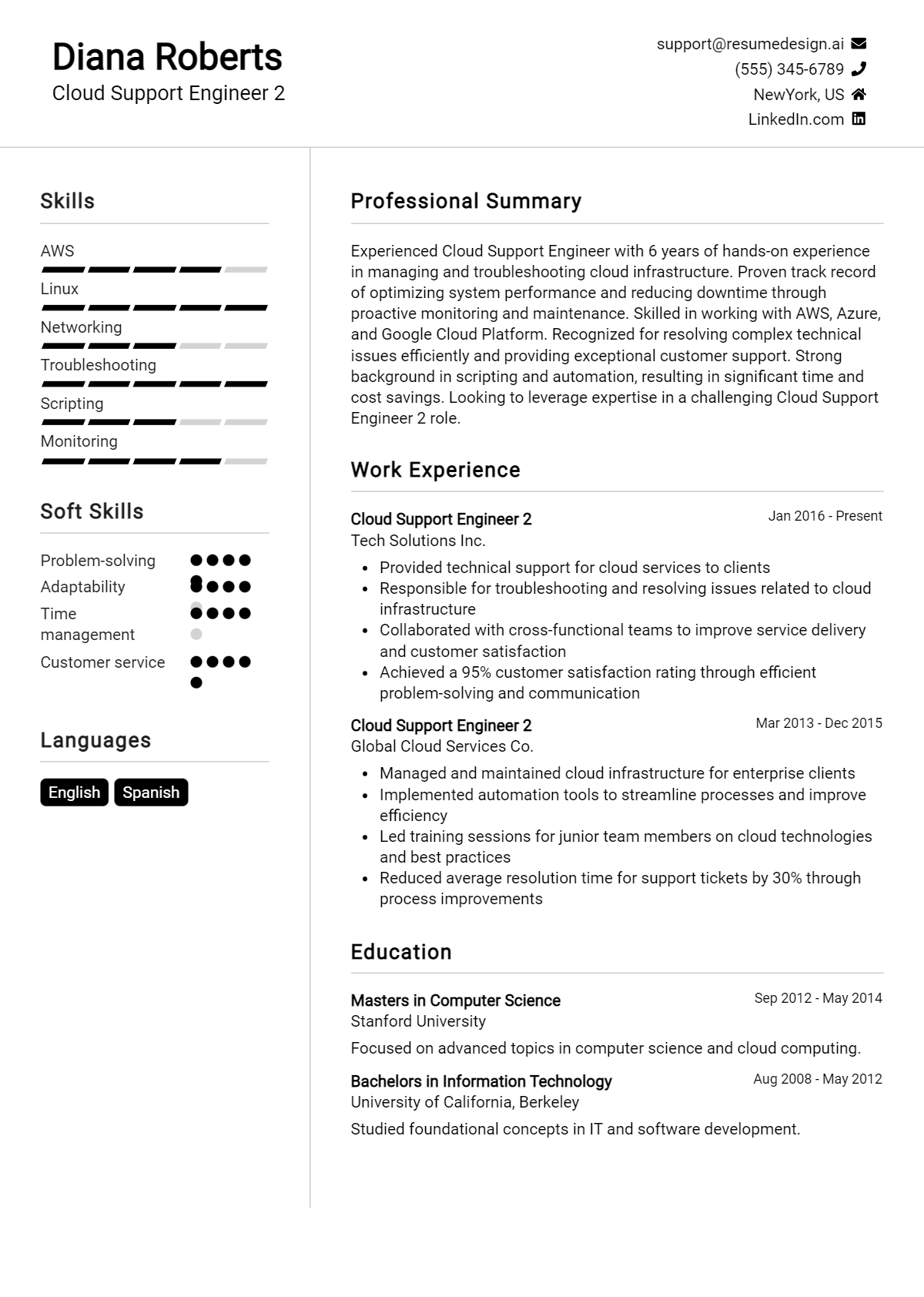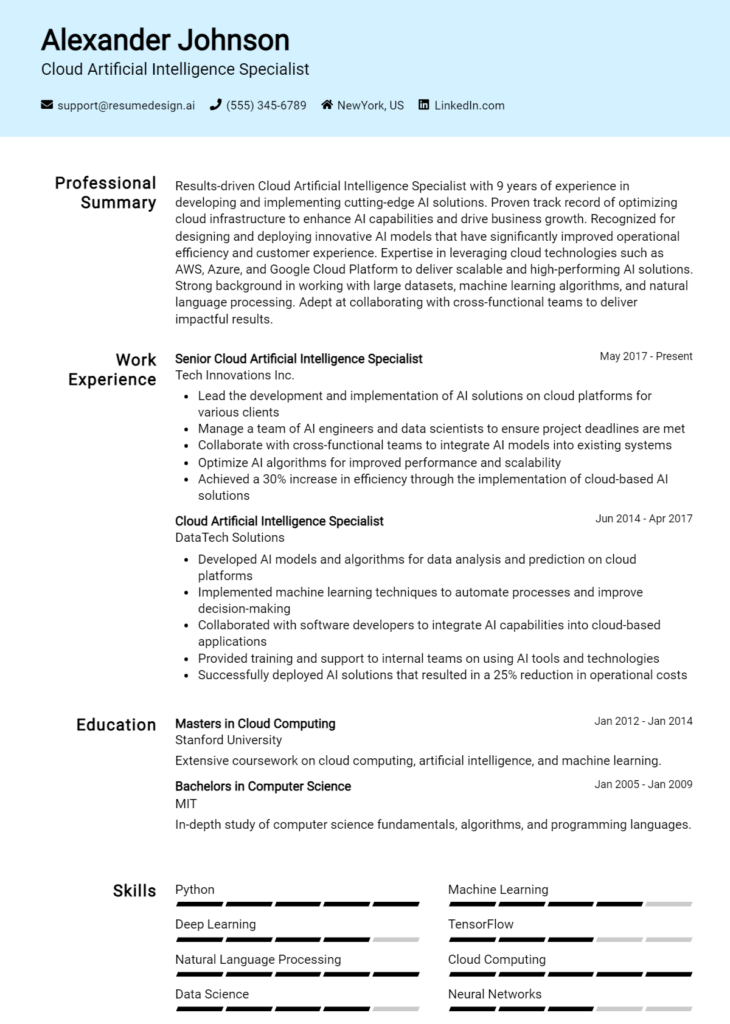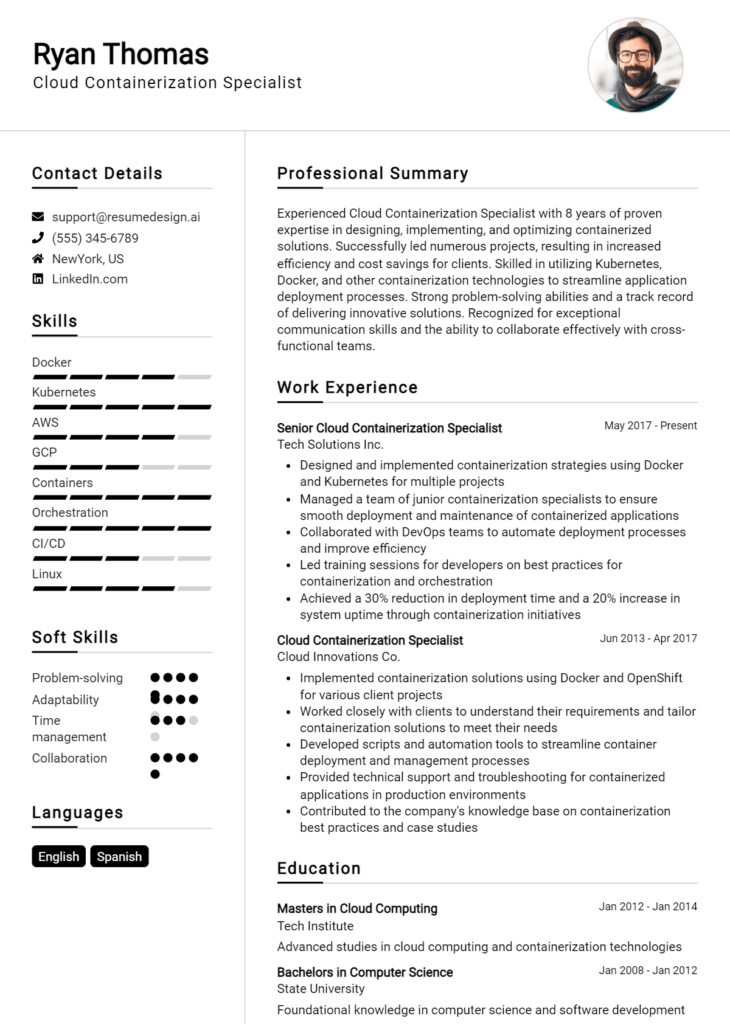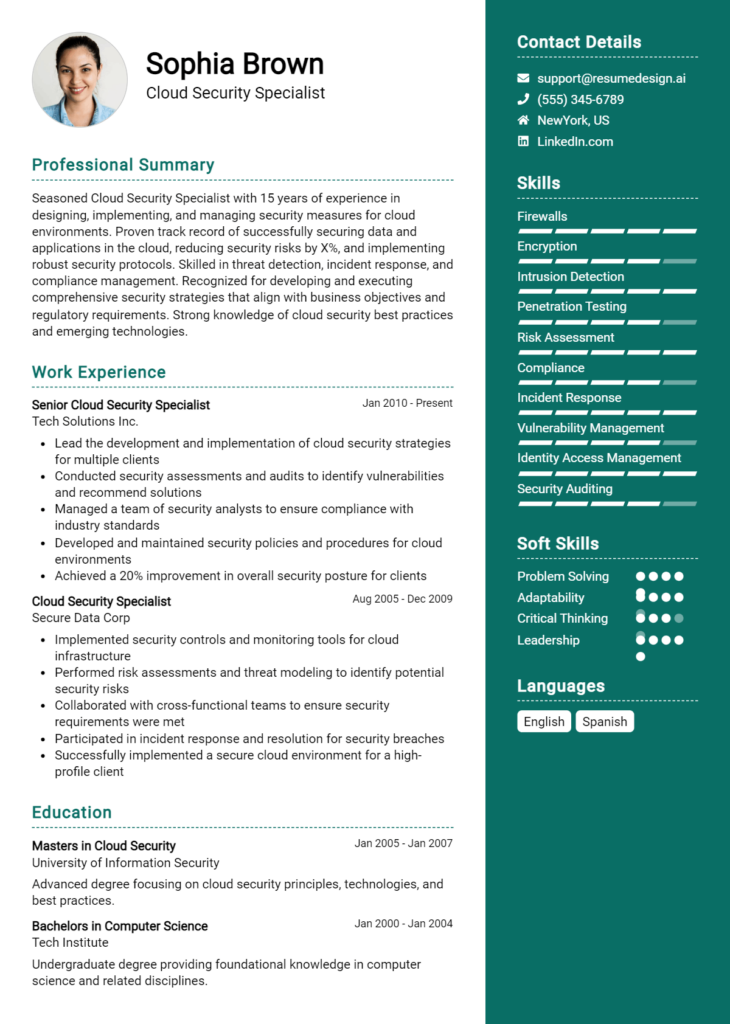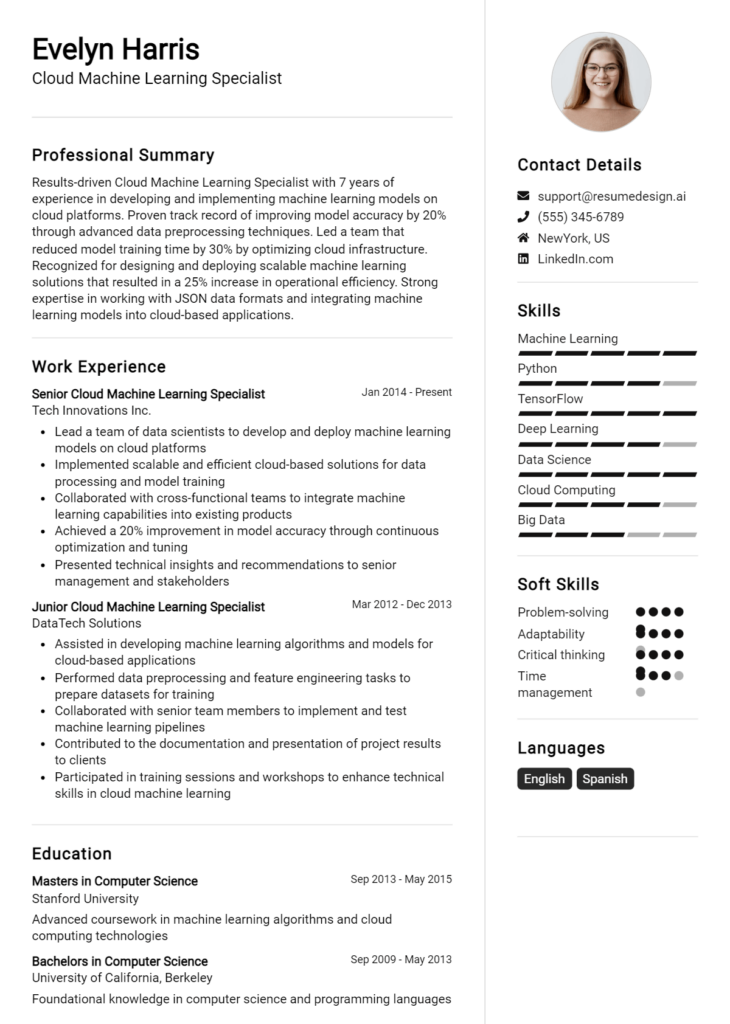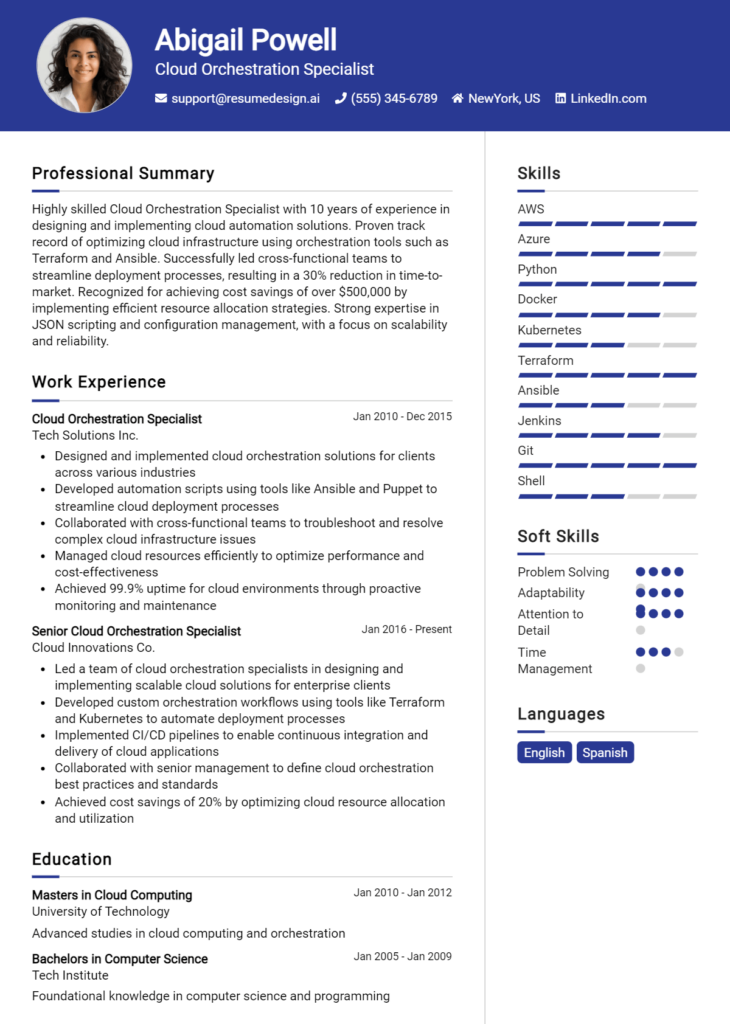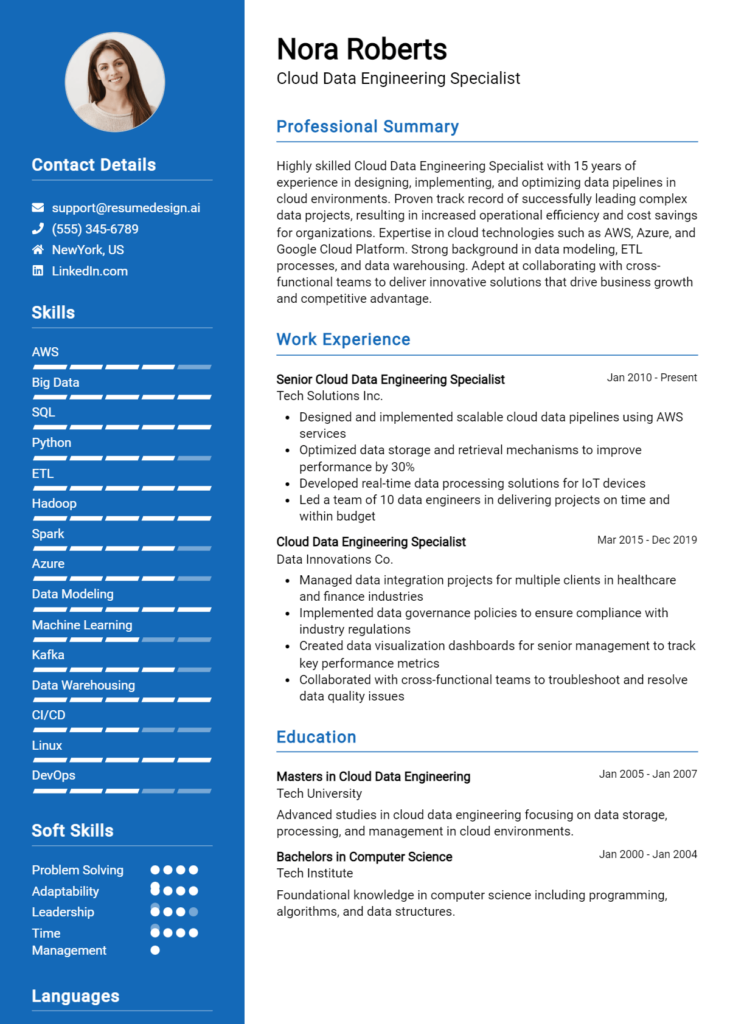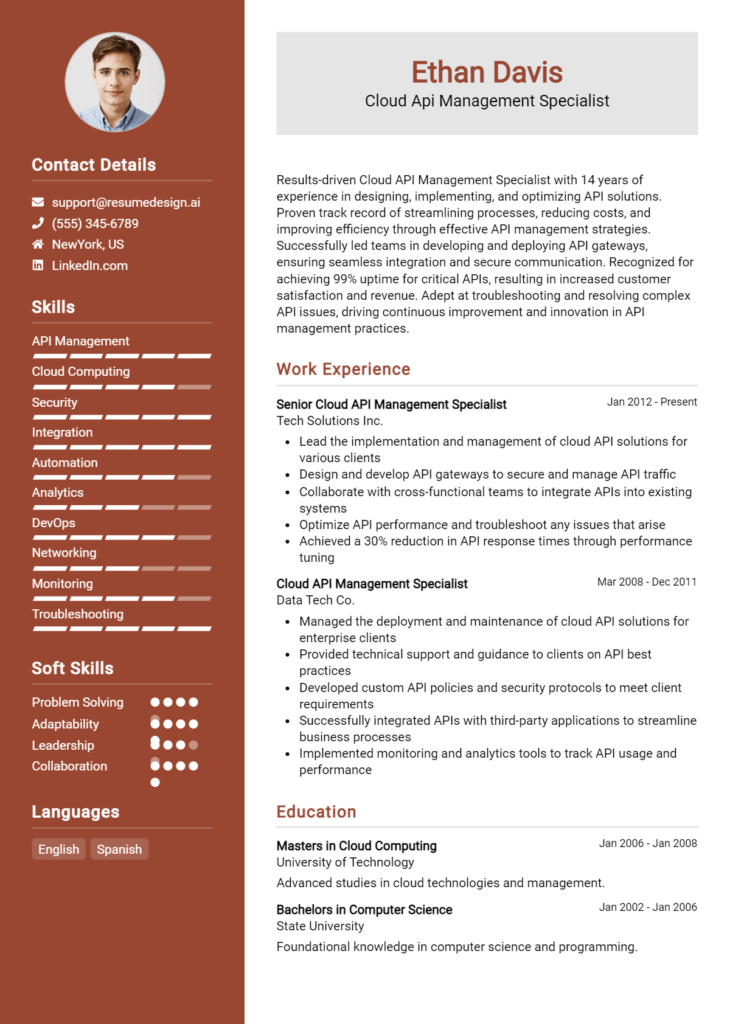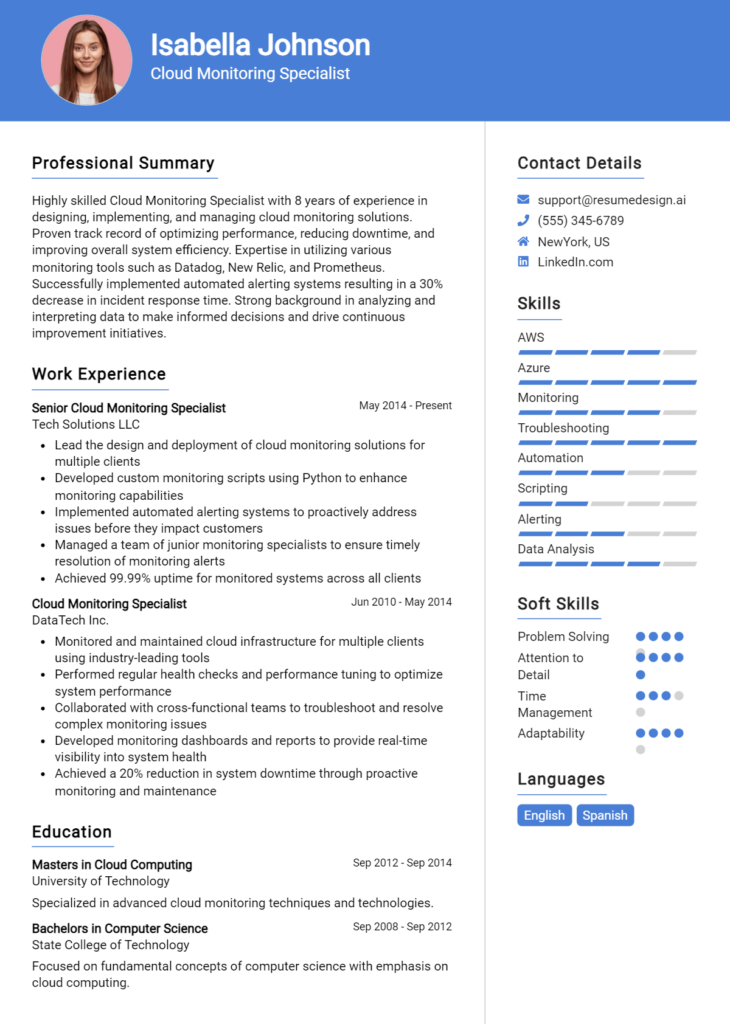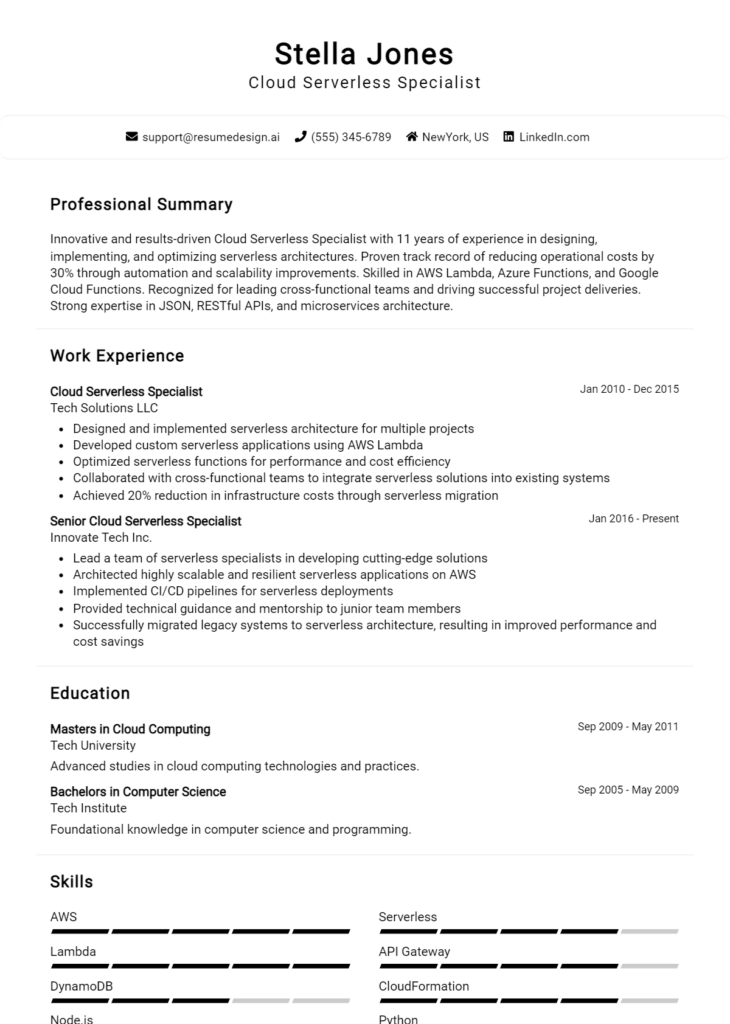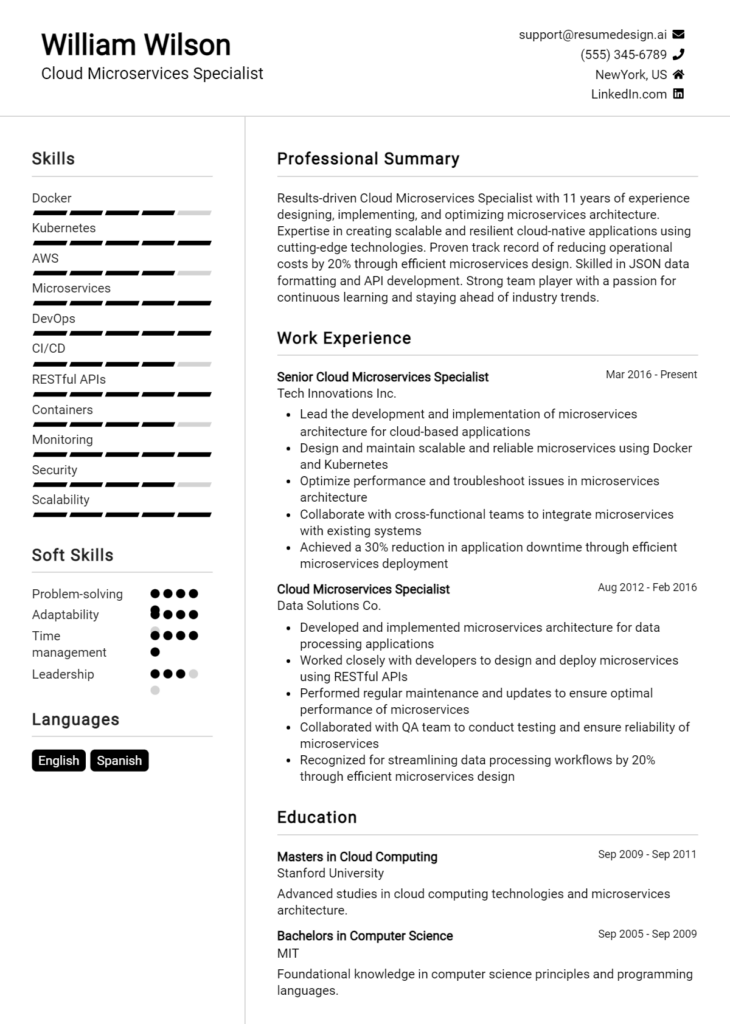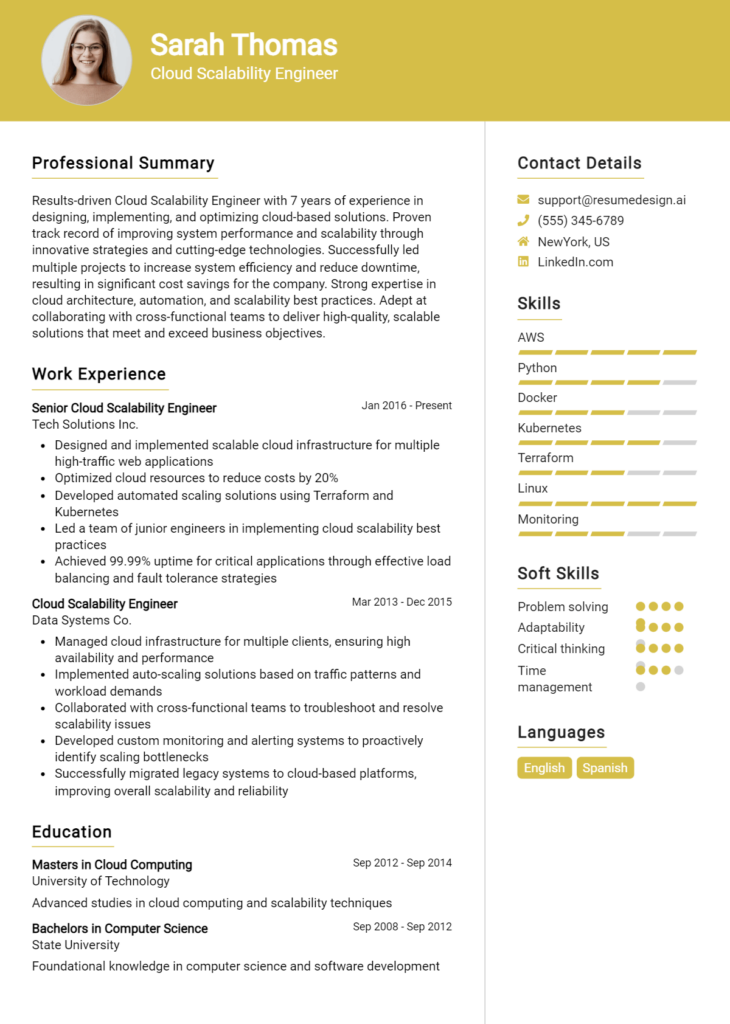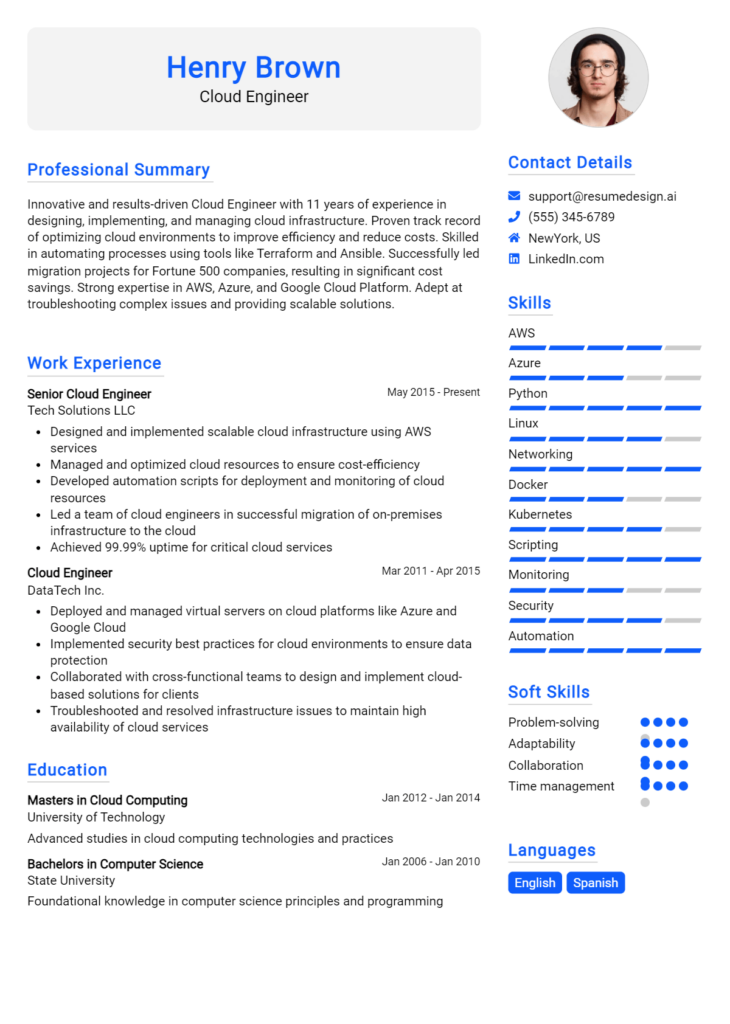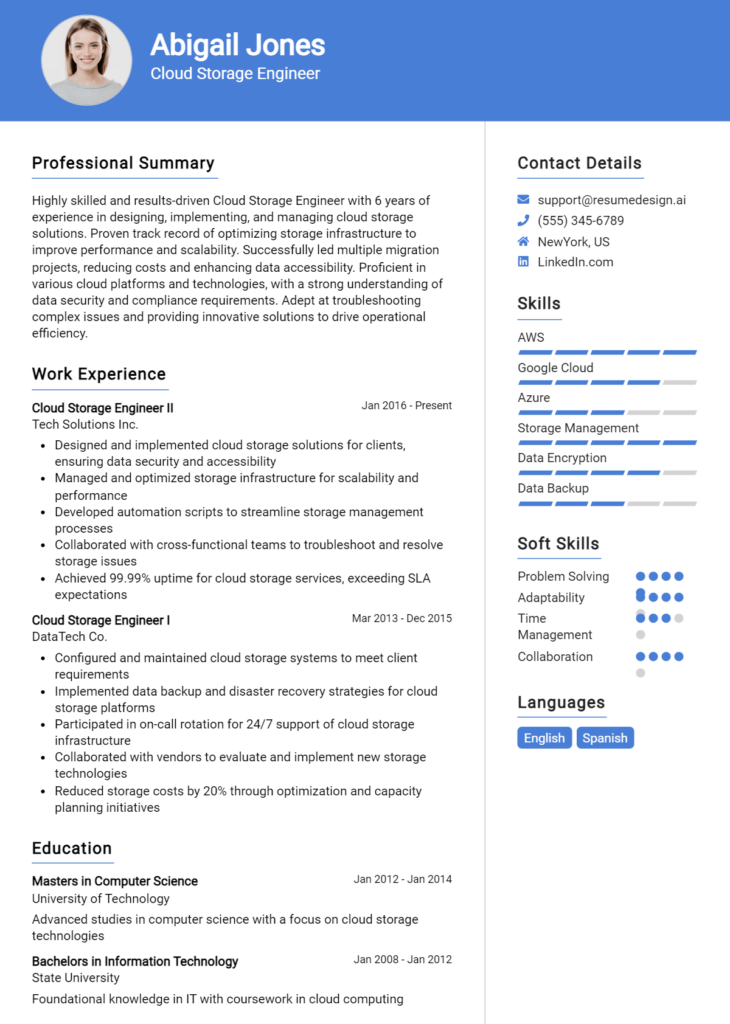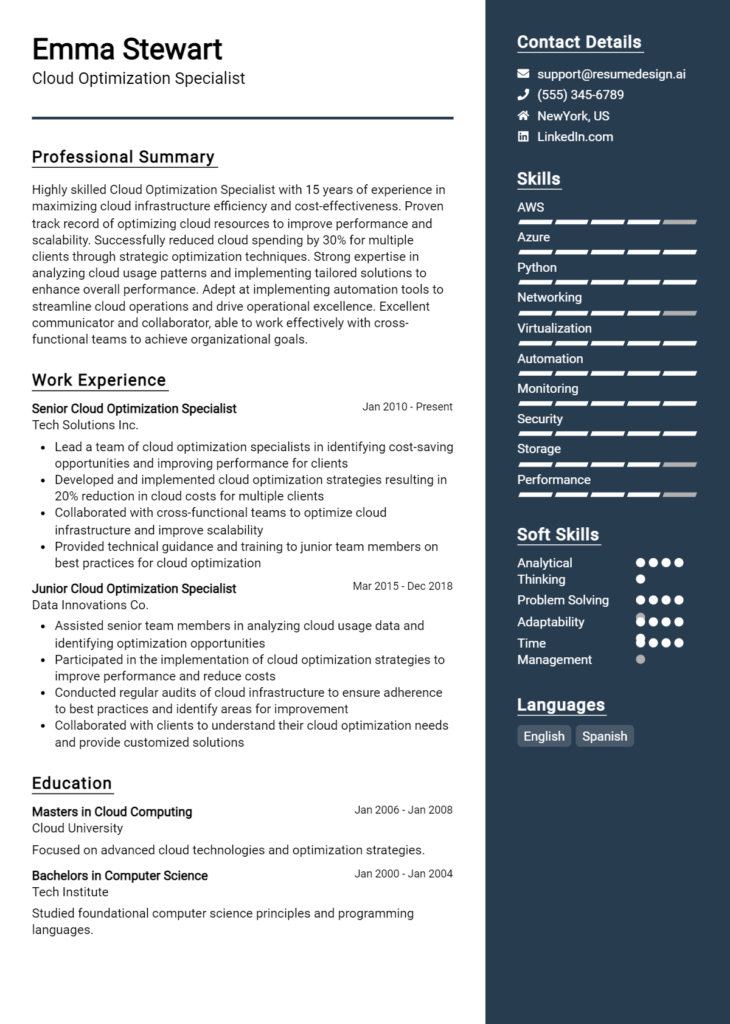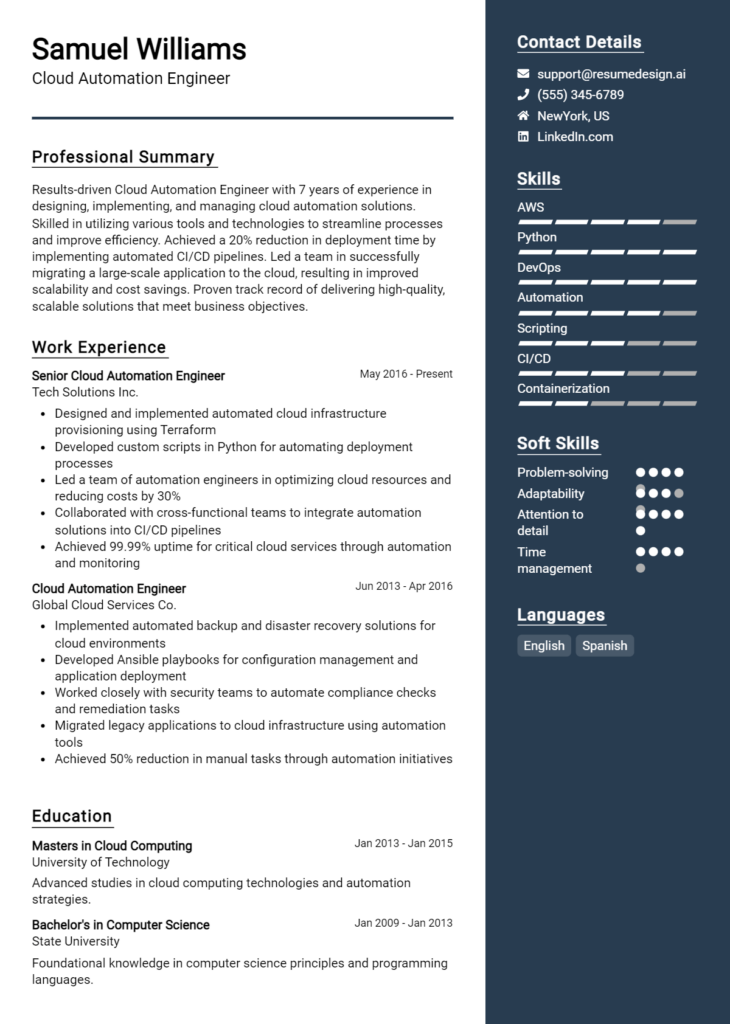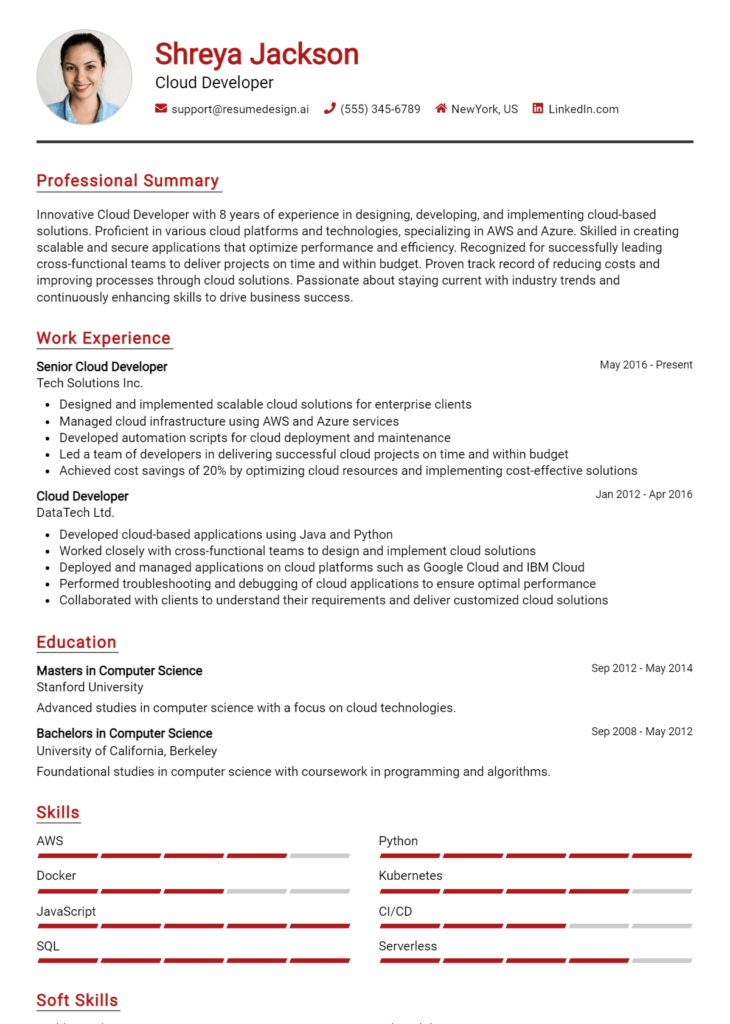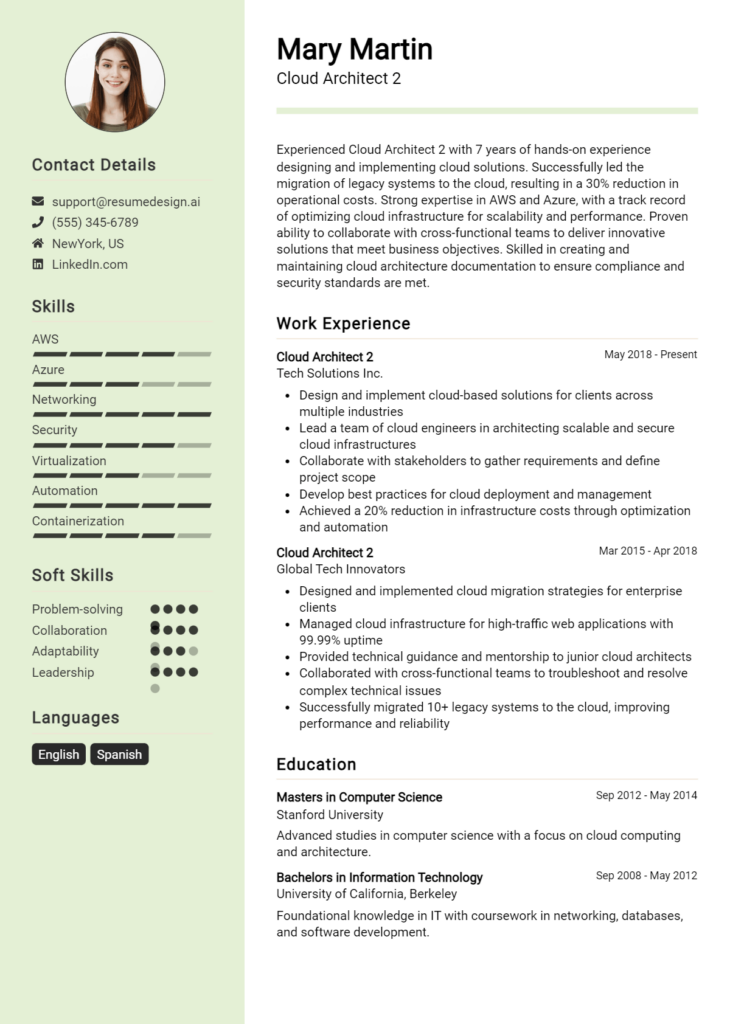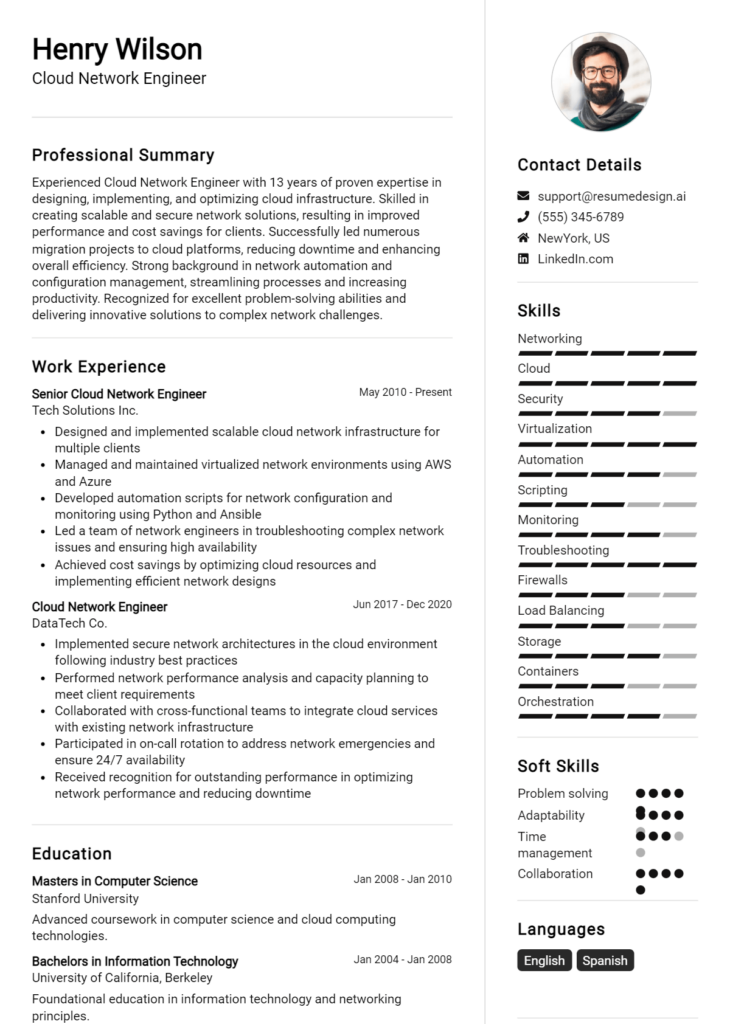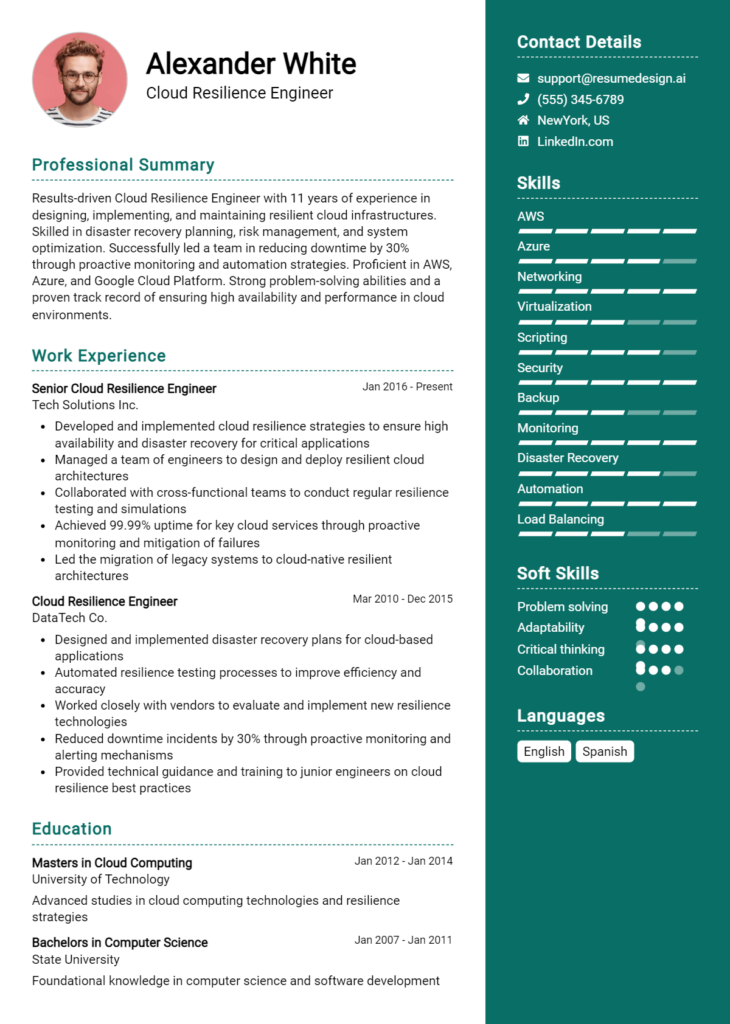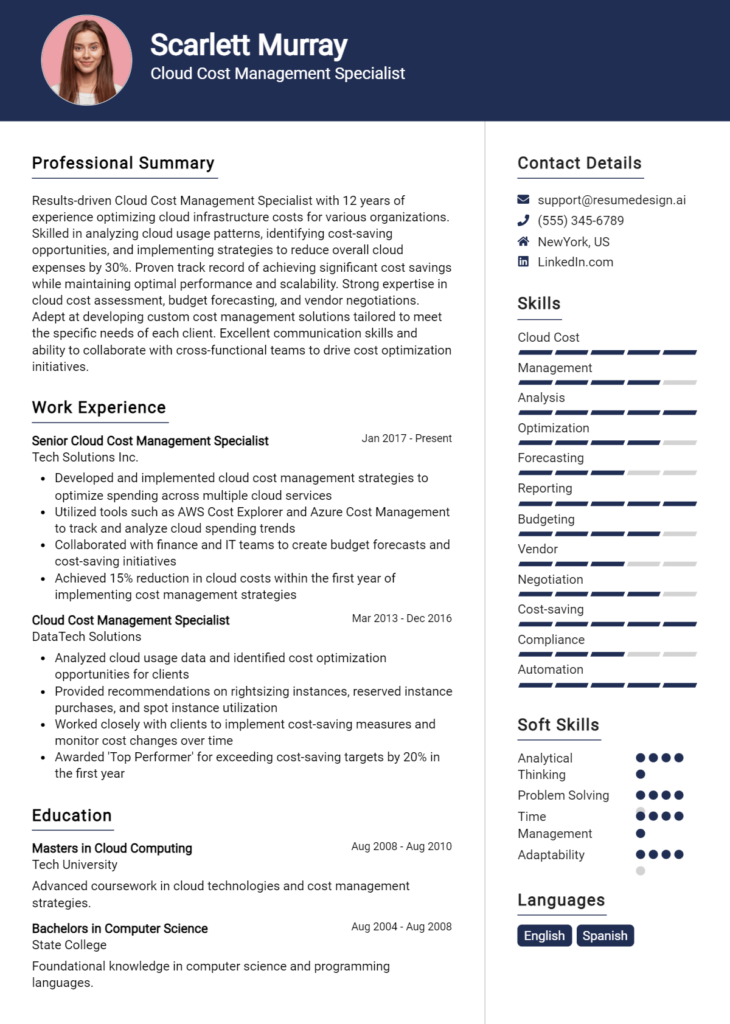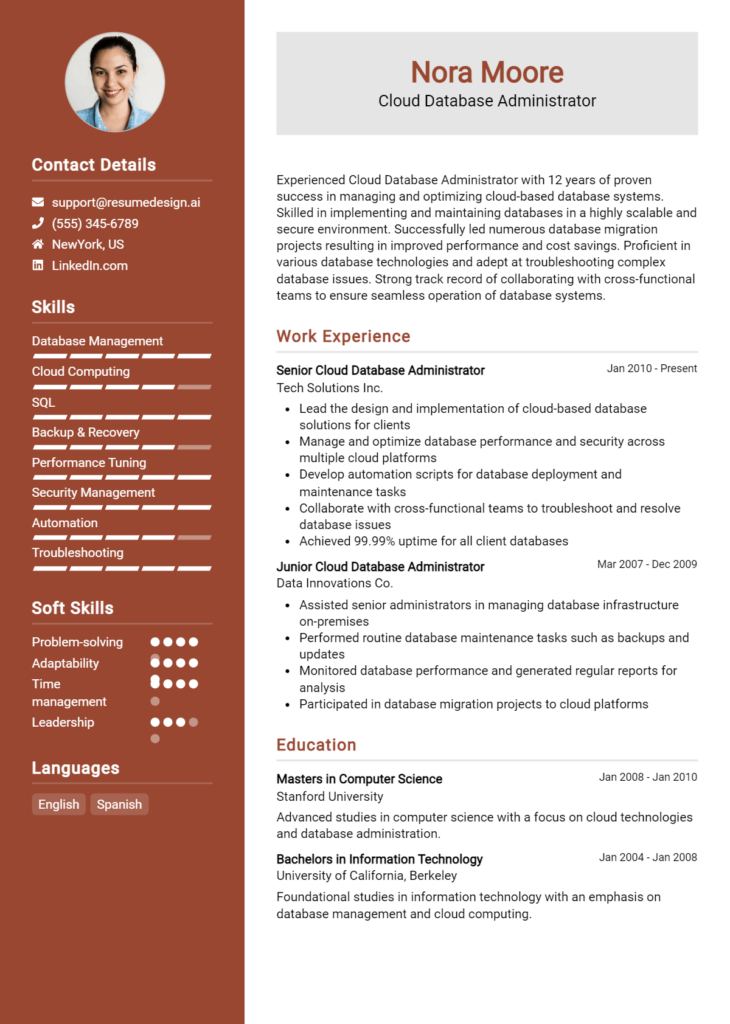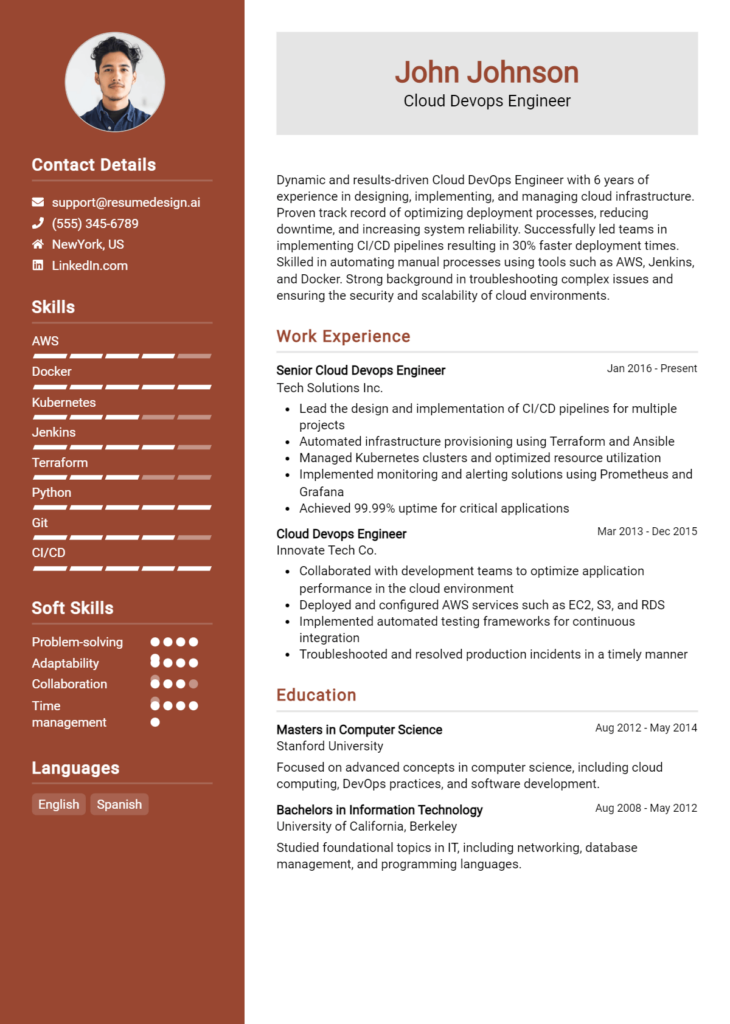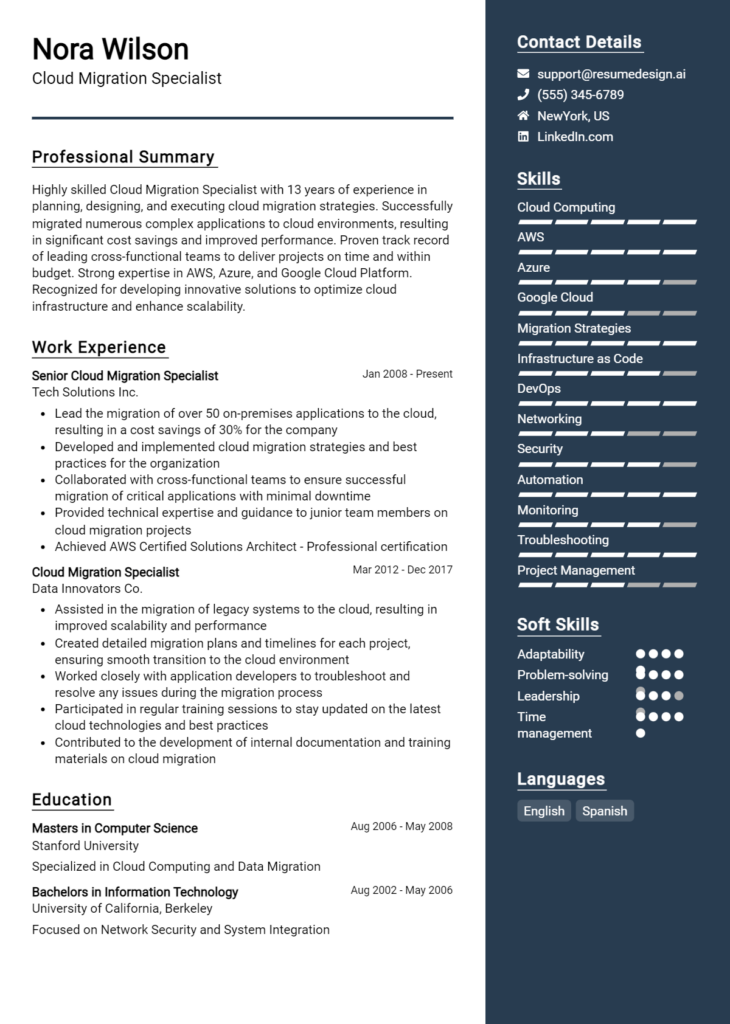Cloud Support Engineer Core Responsibilities
A Cloud Support Engineer plays a vital role in ensuring the functionality and efficiency of cloud-based systems, acting as a bridge between technical teams and end-users. Key responsibilities include troubleshooting issues, optimizing cloud performance, and providing technical support across departments. Essential skills encompass operational understanding, advanced problem-solving capabilities, and technical expertise in cloud platforms. These competencies contribute significantly to achieving organizational goals, and a well-crafted resume can effectively highlight these qualifications, showcasing a candidate's readiness for the role.
Common Responsibilities Listed on Cloud Support Engineer Resume
- Provide technical support for cloud infrastructure and services.
- Troubleshoot and resolve cloud-related incidents and issues.
- Monitor cloud performance and optimize resource usage.
- Collaborate with development and operations teams to improve cloud solutions.
- Document support processes and create user guides.
- Assist in the deployment of cloud applications and services.
- Implement security measures and best practices for cloud environments.
- Conduct training sessions for team members on cloud technologies.
- Stay updated with the latest cloud technologies and trends.
- Participate in on-call rotations for emergency support.
- Provide insights for continuous improvement of cloud services.
High-Level Resume Tips for Cloud Support Engineer Professionals
In today's competitive job market, a well-crafted resume is essential for Cloud Support Engineer professionals seeking to make a lasting impression on potential employers. Your resume is often the first encounter a hiring manager has with your qualifications, and it should effectively showcase both your technical skills and significant achievements in the cloud computing domain. A thoughtfully constructed resume not only highlights your ability to troubleshoot and support cloud infrastructure but also reflects your understanding of industry trends and customer service excellence. This guide will provide practical and actionable resume tips specifically tailored for Cloud Support Engineer professionals, ensuring you stand out in a sea of applicants.
Top Resume Tips for Cloud Support Engineer Professionals
- Tailor your resume to match the job description, using relevant keywords from the posting.
- Highlight your experience with popular cloud platforms such as AWS, Azure, or Google Cloud.
- Showcase your technical skills, including troubleshooting, network configuration, and cloud migration.
- Quantify your achievements with metrics, such as reducing downtime by X% or improving response times.
- Include certifications relevant to cloud technologies, such as AWS Certified Solutions Architect or Azure Fundamentals.
- Demonstrate your problem-solving skills with examples of complex issues you resolved in previous roles.
- Emphasize your experience in customer support and collaboration with cross-functional teams.
- Keep your resume concise, ideally one page, focusing on the most relevant information.
- Utilize a clean and professional format that is easy to read and visually appealing.
By implementing these tips, you can significantly increase your chances of landing a job in the Cloud Support Engineer field. A polished, tailored resume that effectively highlights your skills and accomplishments not only captures the attention of hiring managers but also positions you as a strong candidate who understands the demands of the role. Take the time to refine your resume, and watch as new opportunities in the cloud computing landscape unfold before you.
Why Resume Headlines & Titles are Important for Cloud Support Engineer
In the competitive field of cloud computing, a Cloud Support Engineer plays a crucial role in ensuring the seamless operation of cloud services and applications. However, even the most qualified candidates can find it challenging to stand out in a crowded job market. This is where a well-crafted resume headline or title becomes vital. A strong headline serves as a powerful introduction to the candidate's resume, instantly grabbing the attention of hiring managers by summarizing key qualifications in a concise and relevant phrase. It should directly relate to the specific Cloud Support Engineer position being applied for, providing a snapshot of the candidate's expertise and professional value.
Best Practices for Crafting Resume Headlines for Cloud Support Engineer
- Keep it concise and to the point, ideally under 10 words.
- Use specific keywords relevant to cloud support engineering.
- Highlight your most significant skills or achievements.
- Tailor the headline to match the job description closely.
- Incorporate quantifiable metrics when possible (e.g., years of experience).
- Avoid jargon and overly technical language that may confuse readers.
- Use action words to convey a sense of proactivity and expertise.
- Make it impactful; aim to leave a lasting impression.
Example Resume Headlines for Cloud Support Engineer
Strong Resume Headlines
"Dedicated Cloud Support Engineer with 5+ Years of Experience in AWS and Azure"
“Certified Cloud Solutions Expert Specializing in Troubleshooting and Optimization”
“Proficient Cloud Support Engineer Focused on Enhancing System Reliability and Performance”
“Results-Driven Cloud Support Specialist with Proven Track Record in Incident Management”
Weak Resume Headlines
“Cloud Support Engineer Looking for a Job”
“Experienced Professional in Technology”
Strong headlines are effective because they immediately convey the candidate's qualifications and relevance to the position, enhancing the likelihood of catching a hiring manager's attention. They are specific, impactful, and tailored to the job, showcasing the candidate's strengths. Conversely, weak headlines fail to impress due to their vagueness and lack of focus, providing no clear indication of the candidate's abilities or suitability for the role. By avoiding generic statements and instead opting for specific, action-oriented phrases, candidates can significantly improve their chances of standing out in a competitive job market.
Writing an Exceptional Cloud Support Engineer Resume Summary
A well-crafted resume summary is crucial for a Cloud Support Engineer as it serves as a powerful first impression that can significantly influence hiring managers. This brief overview not only highlights the candidate's key skills, experience, and accomplishments but also sets the tone for the rest of the resume. A strong summary succinctly captures attention, enabling employers to quickly assess the candidate's fit for the role. It should be concise, impactful, and tailored specifically to the job being applied for, ensuring that the most relevant qualifications stand out.
Best Practices for Writing a Cloud Support Engineer Resume Summary
- Quantify Achievements: Use numbers and statistics to illustrate your successes.
- Focus on Relevant Skills: Highlight skills specific to cloud technologies, troubleshooting, and customer support.
- Tailor to the Job Description: Align your summary with keywords and requirements from the job posting.
- Keep It Concise: Aim for 2-4 sentences that capture your strengths and experiences.
- Showcase Technical Proficiency: Mention specific cloud platforms and tools you are experienced with.
- Emphasize Problem-Solving Abilities: Highlight your capability in resolving complex technical issues.
- Include Soft Skills: Mention communication and teamwork skills that are vital in support roles.
- Use Action-Oriented Language: Start with strong action verbs to convey confidence and initiative.
Example Cloud Support Engineer Resume Summaries
Strong Resume Summaries
Dynamic Cloud Support Engineer with over 5 years of experience in managing cloud infrastructure for Fortune 500 companies. Successfully reduced incident response time by 30% through implementation of automated monitoring tools and proactive customer support strategies.
Results-driven Cloud Support Engineer proficient in AWS and Azure, with a proven track record of resolving 95% of support tickets on first contact. Recognized for enhancing user satisfaction by developing comprehensive troubleshooting documentation.
Detail-oriented Cloud Support Engineer with expertise in cloud migration and deployment. Successfully led a team that migrated 100+ applications to a cloud environment, resulting in a 40% decrease in overall IT costs.
Weak Resume Summaries
Experienced IT professional looking for a cloud support role. Good at solving problems and working with technology.
Cloud Support Engineer with some relevant experience and skills. Interested in helping customers with cloud issues.
The strong resume summaries are effective because they provide specific achievements, quantify results, and highlight relevant skills, making the candidates stand out. In contrast, the weak resume summaries lack detail and specificity, making them generic and less impactful, which can fail to capture the interest of hiring managers.
Work Experience Section for Cloud Support Engineer Resume
The work experience section is a crucial component of a Cloud Support Engineer resume, as it provides potential employers with a clear understanding of the candidate's technical skills and practical applications in real-world environments. This section not only highlights the candidate's ability to manage teams and collaborate effectively but also showcases their capacity to deliver high-quality products and services. By quantifying achievements—such as improved system performance, reduced downtime, or enhanced customer satisfaction—and aligning experiences with industry standards, candidates can create a compelling narrative that emphasizes their value to prospective employers.
Best Practices for Cloud Support Engineer Work Experience
- Focus on technical expertise by detailing specific cloud platforms (e.g., AWS, Azure, Google Cloud) and tools you have used.
- Quantify results with metrics, such as percentage improvements, cost savings, or increased efficiency.
- Highlight collaborative projects that demonstrate teamwork, particularly in cross-functional settings.
- Use action verbs to convey a proactive approach, such as "led," "implemented," and "optimized."
- Tailor your experience to match the job description, emphasizing relevant skills and technologies.
- Include certifications or training that validate your technical knowledge and expertise.
- Showcase problem-solving abilities by detailing challenges faced and solutions implemented.
- Keep descriptions concise and focused on achievements rather than just responsibilities.
Example Work Experiences for Cloud Support Engineer
Strong Experiences
- Led a team of 5 in migrating 100+ applications to AWS, resulting in a 30% reduction in operational costs and improved system uptime by 15%.
- Implemented a cloud monitoring solution that reduced incident response time from 60 minutes to 10 minutes, enhancing customer satisfaction scores by 25%.
- Collaborated with cross-functional teams to design and deploy a multi-cloud architecture, ensuring 99.9% availability for critical applications.
- Developed and executed a cloud security strategy that decreased vulnerability assessment findings by 40% within six months.
Weak Experiences
- Responsible for managing cloud services.
- Worked on various cloud projects.
- Assisted with troubleshooting issues in the cloud environment.
- Participated in team meetings and discussions.
The examples labeled as strong are considered effective because they provide specific details about achievements, quantify results, and demonstrate both technical leadership and collaboration. In contrast, the weak experiences are vague and lack measurable outcomes, making it difficult for potential employers to gauge the candidate's actual impact or skills. Strong experiences create a compelling narrative that showcases not only what the candidate has done but also the value they can bring to a new role.
Education and Certifications Section for Cloud Support Engineer Resume
The education and certifications section of a Cloud Support Engineer resume is crucial for showcasing a candidate's academic background and commitment to continuous learning in a rapidly evolving field. This section highlights not only formal education but also industry-relevant certifications and specialized training that demonstrate a candidate's proficiency in cloud technologies and support methodologies. By providing relevant coursework and recognized credentials, candidates can significantly enhance their credibility and alignment with the specific requirements of the job role, making a compelling case for their suitability in a competitive job market.
Best Practices for Cloud Support Engineer Education and Certifications
- Prioritize relevant degrees in Computer Science, Information Technology, or related fields.
- Include industry-recognized certifications such as AWS Certified Solutions Architect or Microsoft Azure Fundamentals.
- List coursework that directly relates to cloud computing, networking, or system administration.
- Use clear formatting to differentiate between degrees, certifications, and specialized training.
- Highlight ongoing education efforts, such as workshops or online courses, to demonstrate commitment to staying current.
- Be specific about the year of completion for certifications to indicate relevance.
- Consider including GPA if it's impressive and relevant to the job.
- Tailor the section to the job description, emphasizing qualifications that match the employer's needs.
Example Education and Certifications for Cloud Support Engineer
Strong Examples
- Bachelor of Science in Computer Science, University of XYZ, Graduated May 2022
- AWS Certified Solutions Architect – Associate, Certification obtained August 2023
- Google Cloud Professional Cloud Architect, Certification obtained June 2023
- Relevant Coursework: Cloud Computing, Network Security, Systems Administration
Weak Examples
- Associate Degree in General Studies, College of ABC, Graduated May 2020
- CompTIA A+ Certification, obtained 2010 (outdated for cloud roles)
- Certification in Basic Computer Skills, obtained January 2015
- High School Diploma, Completed 2019
The strong examples are considered robust because they directly align with the skills and knowledge needed for a Cloud Support Engineer position, showcasing relevant degrees, up-to-date certifications, and applicable coursework. In contrast, the weak examples lack relevance to the cloud computing field, featuring outdated or overly generalized qualifications that do not reflect the candidate's preparedness for the specific demands of the role.
Top Skills & Keywords for Cloud Support Engineer Resume
As a Cloud Support Engineer, possessing the right set of skills is crucial for effectively addressing customer needs and troubleshooting issues in a cloud environment. The competitive landscape of cloud services demands professionals who not only have technical prowess but also excel in communication and problem-solving. A well-crafted resume that highlights both hard and soft skills can significantly enhance your chances of landing an interview. Skills serve as the backbone of your professional identity; they demonstrate your ability to navigate complex cloud environments and provide outstanding support to clients. Emphasizing the right skills in your resume can set you apart from other candidates and showcase your readiness for the challenges that come with the role.
Top Hard & Soft Skills for Cloud Support Engineer
Soft Skills
- Excellent communication skills
- Problem-solving abilities
- Customer service orientation
- Team collaboration
- Adaptability
- Time management
- Attention to detail
- Critical thinking
- Active listening
- Empathy
Hard Skills
- Proficiency in cloud platforms (AWS, Azure, GCP)
- Knowledge of networking concepts and protocols
- Experience with virtualization technologies
- Familiarity with scripting languages (Python, Bash)
- Understanding of database management (SQL, NoSQL)
- Skills in monitoring and troubleshooting tools (CloudWatch, Datadog)
- Experience with configuration management tools (Ansible, Puppet)
- Knowledge of security best practices in cloud environments
- Familiarity with CI/CD pipelines
- Understanding of API integration and management
By incorporating these key skills into your resume, you can effectively showcase your qualifications and attract the attention of potential employers. Additionally, highlighting relevant work experience that complements these skills will further strengthen your application, giving you a competitive edge in the field of cloud support.
Stand Out with a Winning Cloud Support Engineer Cover Letter
Dear Hiring Manager,
I am writing to express my interest in the Cloud Support Engineer position at [Company Name], as advertised on [where you found the job listing]. With a solid background in cloud computing and a passion for providing excellent technical support, I am excited about the opportunity to contribute my skills to your team. My experience working with various cloud platforms, including AWS, Azure, and Google Cloud, has equipped me with the knowledge and expertise to troubleshoot complex issues and deliver effective solutions to clients.
In my previous role at [Previous Company Name], I successfully managed a diverse range of cloud-related support requests, helping clients migrate to cloud environments and optimize their existing applications. I am adept at diagnosing problems, performing root cause analysis, and collaborating with cross-functional teams to implement improvements. My strong communication skills enable me to explain technical concepts clearly, ensuring that clients feel supported and informed throughout the troubleshooting process.
I am particularly drawn to [Company Name] because of its commitment to innovation and customer satisfaction. I admire your dedication to providing cutting-edge solutions that empower businesses to thrive in the digital landscape. I am eager to bring my technical skills and customer-centric approach to your team, helping to enhance the overall client experience and drive success in cloud projects.
Thank you for considering my application. I am looking forward to the opportunity to discuss how my experience and passion for cloud technology can contribute to the ongoing success of [Company Name]. I am excited about the possibility of working with a talented team and delivering exceptional support to your clients.
Sincerely,
[Your Name]
[Your Contact Information]
[LinkedIn Profile or Website, if applicable]
Common Mistakes to Avoid in a Cloud Support Engineer Resume
When crafting a resume for a Cloud Support Engineer position, many candidates overlook crucial elements that can significantly impact their chances of landing an interview. A resume serves as your first impression, and it’s essential to avoid common pitfalls that could undermine your qualifications or misrepresent your skills. Here are some common mistakes to be aware of while preparing your Cloud Support Engineer resume:
Neglecting Relevant Keywords: Failing to include industry-specific keywords can result in your resume being filtered out by Applicant Tracking Systems (ATS). Make sure to incorporate terms related to cloud technologies, tools, and methodologies.
Vague Job Descriptions: Providing generic descriptions of past roles without quantifiable achievements can make your resume less impactful. Instead, detail specific responsibilities and highlight metrics that illustrate your success.
Ignoring Soft Skills: Cloud Support Engineers need strong communication and problem-solving skills. Neglecting to mention these soft skills can give the impression that you lack the interpersonal abilities necessary for customer support roles.
Overloading with Technical Jargon: While technical expertise is important, using excessive jargon can alienate hiring managers who may not be as familiar with every term. Strive for a balance that showcases your knowledge without overwhelming the reader.
Lack of Tailoring for Each Application: Sending out a generic resume to multiple employers can reduce your chances of getting noticed. Tailor your resume to each specific job description, highlighting the skills and experiences that are most relevant.
Not Showcasing Continuous Learning: The cloud computing landscape is constantly evolving. Failing to mention certifications, courses, or ongoing education can suggest that you aren't committed to keeping your skills up to date.
Inconsistent Formatting: A cluttered or inconsistent format can detract from the professionalism of your resume. Ensure that font sizes, bullet points, and spacing are uniform throughout to present a polished document.
Excessive Length: A lengthy resume can overwhelm hiring managers. Aim to keep your resume concise, ideally one page, focusing on the most relevant experiences and skills for the Cloud Support Engineer role.
Conclusion
As we explored the role of a Cloud Support Engineer, we highlighted the essential skills and qualifications required to excel in this fast-evolving field. Key responsibilities include troubleshooting cloud-related issues, providing technical support, and collaborating with development teams to enhance cloud infrastructure. We also discussed the importance of relevant certifications and a strong understanding of cloud platforms such as AWS, Azure, and Google Cloud.
To ensure you stand out in this competitive job market, it's crucial to have a polished resume that effectively showcases your expertise and accomplishments. We encourage you to take a moment to review your Cloud Support Engineer resume and make any necessary updates.
To assist you in this process, consider utilizing the following resources:
- Explore resume templates to find a design that fits your style.
- Use the resume builder for a user-friendly way to create a professional resume.
- Check out resume examples for inspiration and ideas on how to present your experience.
- Don’t forget to craft a compelling cover letter with the help of cover letter templates that resonate with potential employers.
Take action today to enhance your resume and increase your chances of landing your dream job as a Cloud Support Engineer!

